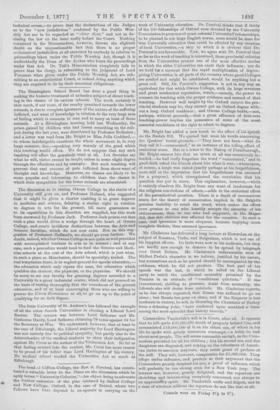The head of Clifton College, the Rev. J. Percival, has
contri- buted a valuable letter to the Times on the discussion which he aptly terms " University Colonies,"—his object being to advocate the further extension of the plan initiated by Balliol College
tlar and New College, Oxford, in the case of Bristol, where two Fellows have been deputed to co.operate in carrying on the
work of University education. Dr. Percival thinks that if thirty of the 250 fellowships of Oxford were devoted by the University Commission to purposes of quasi- colonial UniversityProfessorships, to be planted in our large English towns, more would be done for true University education than could be effected by any creation of local Universities,—a step to which it is obvious that Dr. Percival is not favourable. Now, we agree with Dr. Percival that so far as the work of teaching is concerned, these provincial colonies from the Universities present one of the most effective modes in which the older Universities can exert their influence ; nor do we hold for a moment that the rapid multiplication of degree- giving Universities in all parts of the country where good Colleges, are needed and might be established, would be anything but a great evil. Still, Dr. Percivars suggestion is not he any way an equivalent for that which Owens College, with its large revenues and great academical reputation, wants,—namely, the power to connect its teaching with the proper evidence and reward of that teaching. However well taught by the Oxford emigres the pro- vincial students may be, they cannot get an Oxford degree with- out a long Oxford residence ; and Owens College holds,—not, perhaps, without grounds,—that a great affluence of first-rate teaching-power implies the possession of some of the most essential conditions of the right to admit to degrees.






































 Previous page
Previous page